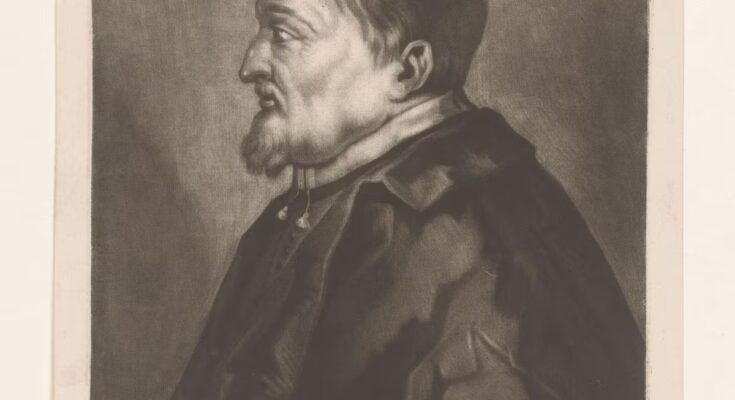Four Miguels make the Spanish genius, according to Machado. Miguel Servet, Miguel de Cervantes, Miguel de Unamuno and Miguel de Molinos. Servetus was burned at the stake, Cervantes was imprisoned in Seville and held prisoner in Algiers, Unamuno was exiled to Fuerteventura, and Molinos died in the dungeons of the Inquisition. Lorca was murdered, Gaudí was run over, Camarón was drunk, Juan Ramón was poor and exiled, Vives, Buñuel and Picasso made careers abroad. It is not a country for geniuses. Yet there are many: Molinos may be one of the most unique and forgotten. 350 years have now passed since the publication of Spiritual guidea book that shocked Christian Europe. A story that ended badly, but whose intuitions will return under other masks.
After a few years spent in Valencia, in which he came into contact with Juan Falconi and the quietist heirs of Juan Sanz, Molinos was sent to Rome. He immediately acquired fame and power, his devotees considered him an oracle and his method received continuous signs of support. He enjoys the friendship of Pope Innocent XI, head of the Jesuits and Christina of Sweden. Cardinals, monsignors and ladies of society become followers of the sagacious enlightened ascetic. “It crowns the pinnacle of prestige and in a few years sinks into the abyss of denigration” (Tellechea). In 1675, at the height of his celebrity, he published the Spiritual guide. His name spread throughout Europe, the book reached more than 20 editions in various languages. It offers a method to “unburden the soul” and “calm the mind.” His star shines so brightly that his early Jesuit opponents are surprised to see his anti-Molinist works included in the Index. But it is a temporary victory. A year later, after the denunciation of Cardinal D’Estrées, the Guide It is added to the Index of Banned Books.
What does the Guide? The proposal is not new. It is based on an assumption that the philosopher of science Karl Popper would vindicate centuries later. You can only know what is false. This is science, the slow progress of discarding the false. The quietist challenge is simple and radical: annihilate the powers of the soul (memory, intellect and will) “so that God can live in it”. Memories, ambitions and concepts are the noise that prevents the divine from living there. An itinerary with oriental roots, put to the test by the Enlightenmentists, who were ferociously persecuted. The quietists will do the same. And not without reason: Western civilization, built on the cult of the individual, imagination and will, risks collapsing.
Like Taoists or Hindu sages, quietists consider activity to be the enemy of grace. Everything important falls from the sky like rain. Nor is it advisable to try to understand. Understanding is the enemy of grace: it makes it impossible for God, the incomprehensible, to dwell there. The proposal is radical. Wanting to know is a desire of the ego (very legitimate, if we want to believe Aristotle), but it prevents “God from being in you”. It’s not about desiring nothingness, as its critics claim. The experience of nothingness is healthy, but that knowledge must also die.
Molinos seeks a state beyond the symbolic. A fabulous nonsense, Moorish, Andalusian, Aragonese, Quixotic
We can only know what is false. Stillness requires perfect incomprehensibility. And what is understanding? Symbolic dependence. The continued use of what Richard Rorty called interrupt the conversation. Conceptual resource that blocks dialogue by invoking an ultimate authority (whether the electron, the neuron, or human nature) and functions as a discussion closure. Molinos, like the Shādhili mystics, seeks a state beyond the symbolic. A fabulous nonsense, Moorish, Andalusian, Aragonese, Quixotic, with resonances in the mystique of all climes.
It is not surprising that Molinos earned the hatred of the Jesuits. THE Spiritual exerciseslike those of quantum theory, they are imaginative exercises. And imagination must be discarded. “The closer it comes to the imagination, the further the soul distances itself from God and the greater the danger it runs, since God, being unknowable as he is, does not fall into the imagination.” The idea comes from Saint John of the Cross, another precursor of the prayer of quiet. “There is no need to fear that memory is empty of its forms and figures, because God has no form or figure.” An idea inherited from Jewish and Sufi mysticism, as Lola Josa and Luce López-Baralt have demonstrated. Imagination is the enemy because it disturbs the soul, it prevents God from remaining in it and working from it. God is the only worker. But we imagine (and want) to be subjects. That imagination moves the theater of the world. A creative and fantastic illusion, but ultimately unreal.
The enemies of stillness are the spiritual master, the demon and the soul. The teacher because there are few who have had the experience. The devil for his worldly and spiritual temptations. The soul from its inclinations and habits. Molinos distinguishes soul and spirit. What is characteristic of the soul is meditation, which is imagination, memory and will. What is characteristic of the spirit is contemplation, which is the stripping away of those habits: looking without memory or desire. Assimilating the soul to the spirit, a radical deconstruction so that “God is in you”.
Molinos was perhaps a sensual and ambitious character. You don’t get to the top of power if you don’t look. In India he would have been a tantric master, expert in methods and full of ego. But the West has not managed to shake off the aura of puritanism that permeates religious life. Molinos was accused of being a wolf in sheep’s clothing. His letters condemned him, not his books, in which he protected himself under the protection of the authorities. Aside from the brutality of his condemnation, which unequivocally expresses our culture’s fear of dealing with the Shadow, in quietism lives a possibility and a logic that was hastily discarded. The mystic speaks, but wants to silence the noise of language. It lives between the lines, but has the existence of a non-explicit, traveled, evolutionary meaning, where word and silence contemplate and smile. Because neither silence nor words can explain the indescribable emptiness of the divine.



